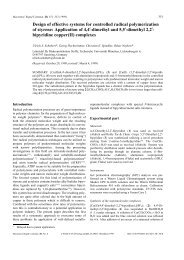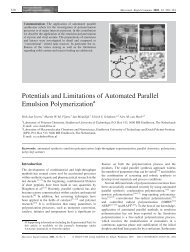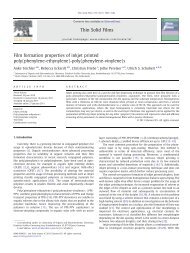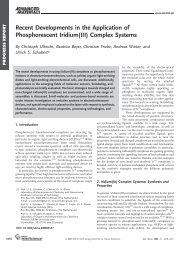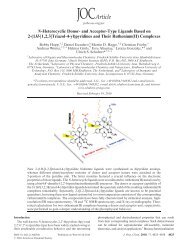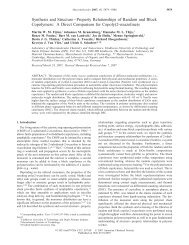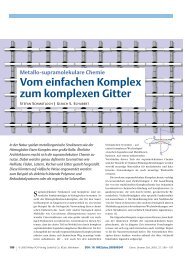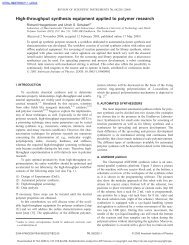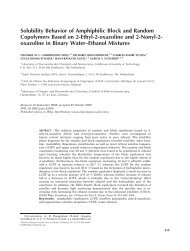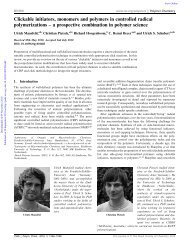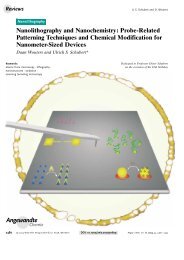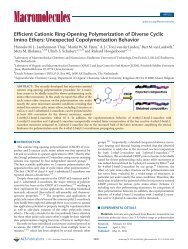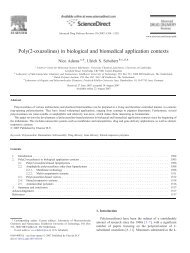Microwave-Assisted Polymer Synthesis: Recent Developments in a ...
Microwave-Assisted Polymer Synthesis: Recent Developments in a ...
Microwave-Assisted Polymer Synthesis: Recent Developments in a ...
You also want an ePaper? Increase the reach of your titles
YUMPU automatically turns print PDFs into web optimized ePapers that Google loves.
<strong>Microwave</strong>-<strong>Assisted</strong> <strong>Polymer</strong> <strong>Synthesis</strong>: <strong>Recent</strong> <strong>Developments</strong> <strong>in</strong> ...<br />
reaction mixture, whereby the use of good microwave<br />
absorb<strong>in</strong>g solvents results <strong>in</strong> very fast heat<strong>in</strong>g. [5] Besides<br />
the advantages of fast and homogeneous heat<strong>in</strong>g as well<br />
as the possible high-temperature chemistry, non-thermal<br />
microwave effects due to specific heat<strong>in</strong>g of polar <strong>in</strong>termediates<br />
have been observed, e.g., lead<strong>in</strong>g to modified<br />
Richard Hoogenboom was born <strong>in</strong> 1978 <strong>in</strong> Rotterdam<br />
(The Netherlands). In 2001 he obta<strong>in</strong>ed<br />
his M.Sc. degree <strong>in</strong> chemical eng<strong>in</strong>eer<strong>in</strong>g at the<br />
E<strong>in</strong>dhoven University of Technology, whereby his<br />
undergraduate research was performed <strong>in</strong> the<br />
group of Bert Meijer (E<strong>in</strong>dhoven, The Netherlands).<br />
Dur<strong>in</strong>g the studies, he performed an <strong>in</strong>ternship<br />
with<strong>in</strong> the group of Andrew Holmes (Cambridge,<br />
United K<strong>in</strong>gdom). In 2005, he obta<strong>in</strong>ed his Ph.D.<br />
under supervision of Ulrich S. Schubert (E<strong>in</strong>dhoven,<br />
The Netherlands) focus<strong>in</strong>g on supramolecular<br />
<strong>in</strong>itiators for controlled polymerization<br />
techniques, automated parallel synthesis of<br />
well-def<strong>in</strong>ed polymers and microwave irradiation<br />
<strong>in</strong> polymer chemistry. Currently, he is work<strong>in</strong>g<br />
as project leader for the Dutch <strong>Polymer</strong><br />
Institute (DPI) with a major focus on the use<br />
of high-throughput experimentation and microwave<br />
irradiation for liv<strong>in</strong>g/controlled polymerization<br />
techniques.<br />
Ulrich S. Schubert was born <strong>in</strong> Tüb<strong>in</strong>gen <strong>in</strong> 1969.<br />
He studied chemistry at the Universities of Frankfurt<br />
and Bayreuth (both Germany) and the Virg<strong>in</strong>ia<br />
Commonwealth University, Richmond (USA).<br />
His Ph.D. work was performed under the supervision<br />
of Professor Eisenbach (Bayreuth, Germany)<br />
and Professor Newkome (Florida, USA). In 1995 he<br />
obta<strong>in</strong>ed his doctorate with Prof. Eisenbach. After<br />
a postdoctoral tra<strong>in</strong><strong>in</strong>g with Professor Lehn at the<br />
Université Strasbourg (France) he moved to the<br />
Technische Universität München (Germany) to<br />
obta<strong>in</strong> his habilitation <strong>in</strong> 1999 (with Professor<br />
Nuyken). From 1999 to spr<strong>in</strong>g 2000 he held a<br />
temporal position as a professor at the Center<br />
for NanoScience at the Universität München<br />
(Germany). S<strong>in</strong>ce Summer 2000 he is Full-<br />
Professor at the E<strong>in</strong>dhoven University of Technology<br />
(Chair for Macromolecular Chemistry and<br />
Nanoscience). From 2003 on he is member of<br />
the management team of the Dutch <strong>Polymer</strong><br />
Institute. His awards <strong>in</strong>clude the Bayerischen<br />
Habilitations-Förderpreis, the Habilitandenpreis<br />
of the GDCh (Makromolekulare Chemie), the<br />
Heisenberg-Stipendium of the DFG, the Dozenten-<br />
Stipendium of the Fonds der Chemischen Industrie<br />
and a VICI award of NWO. The major focus of<br />
the research <strong>in</strong>terest of his relates to organic<br />
heterocyclic chemistry, supramolecular materials,<br />
comb<strong>in</strong>atorial material research, nanoscience and<br />
tailor-made macromolecules.<br />
selectivities and enabl<strong>in</strong>g reactions that cannot be performed<br />
with thermal heat<strong>in</strong>g. [6] These non-thermal microwave<br />
effects are thought to arise from specific microwave<br />
absorption by polar components of a reaction mak<strong>in</strong>g<br />
them more reactive under microwave irradiation when<br />
compared to thermal heat<strong>in</strong>g.<br />
The use of microwave irradiation <strong>in</strong> polymer chemistry<br />
is an emerg<strong>in</strong>g field of research that we reviewed <strong>in</strong><br />
2004. [7] Up to that moment, many <strong>in</strong>vestigations of<br />
microwave-assisted polymerizations were conducted <strong>in</strong><br />
domestic microwave ovens mak<strong>in</strong>g the reproducibility<br />
and safety of the experiments doubtful due to <strong>in</strong>sufficient<br />
temperature control. However, the development of commercial<br />
microwave synthesizers with excellent temperature<br />
control significantly improved the reliability of the<br />
reported microwave-assisted polymerizations. As a result,<br />
the number of publications on microwave-assisted polymerizations<br />
per year has shown a rapid expansion<br />
(Figure 1). [8] In fact, a similar figure <strong>in</strong> the previous review<br />
showed maximum 90 publications per year, which almost<br />
doubled <strong>in</strong> the last two years.<br />
In the current review, the progress <strong>in</strong> the field of<br />
microwave-assisted polymer synthesis s<strong>in</strong>ce the previous<br />
review will be discussed with a ma<strong>in</strong> focus on step-growth<br />
polymerizations, r<strong>in</strong>g-open<strong>in</strong>g polymerization, and (controlled)<br />
radical polymerizations. Special attention will be<br />
given to the occurrence of non-thermal microwave effects,<br />
which is still a controversial topic.<br />
Step-Growth <strong>Polymer</strong>ization<br />
Step-growth polymerizations are based on the coupl<strong>in</strong>g of<br />
two multifunctional, mostly bifunctional, monomers.<br />
The result<strong>in</strong>g coupled product also conta<strong>in</strong>s the functional<br />
groups and thus reacts <strong>in</strong> the same manner as the<br />
Figure 1. Number of publications on microwave-assisted<br />
polymerizations per year. [8]<br />
Macromol. Rapid Commun. 2007, 28, 368–386<br />
ß 2007 WILEY-VCH Verlag GmbH & Co. KGaA, We<strong>in</strong>heim www.mrc-journal.de 369



